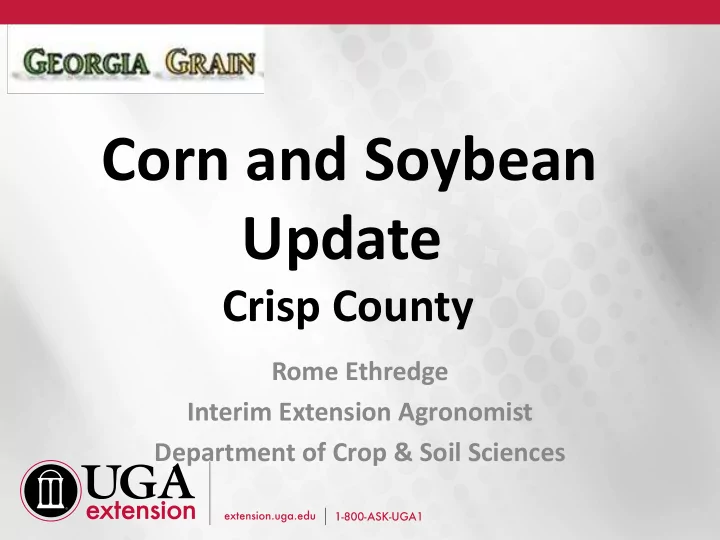

Corn and Soybean Update Crisp County Rome Ethredge Interim Extension Agronomist Department of Crop & Soil Sciences
Planting ◼ Strip till, rip under row ◼ Plant 2 inches deep for good rooting ◼ Row Spacing 36 ,30, or 20 inches or twins ◼ Plant Population – 34,000 irrigated, 20,000 Dry Depends on hybrid Plant at least 3 different hybrids.
35 Critical days ◼ Just before tassel through Milk stage Days 55-90 ◼ Tasseling VT and Silking R1 (Pollination Problems) ◼ Blister Stage R2 (kernel abortion) ◼ Milk Stage R3 (Roastin ’ Ear) (kernel abortion)
Silking Blister Milk Dough Dent Pollination problems Kernel Abortion Kernel weight
Avoid plant stress ◼ Stress can hurt pollen, but ½ million for 550 kernels, 4-8 days ◼ Stress can hurt silks, More likely but wet canopy helps, can be 6 degrees cooler. Scattered grains. ◼ Plant can abort young kernels during blister and milk stages, sunken in. Ear tip.
Pollination Misses on left, under end gun .
R4 Dough Stage R3 Milk Stage (Roastin ’ Ear stage) Highest water use time - 2.4 inches a week Kernel Abortion still possible.
Irrigation system broke down for 2 weeks during blister and milk stage. Kernel abortion occurred.
¼ Milkline - Needs almost 3 more weeks and 1.8 inch of water this week
Tifton, Ga
Protect Leaves ◼ No more leaves after tassel or many roots ◼ Ear leaf and one below and one above 60 % of the active surface area
Harvest Before 20% Better quality and yield Less risk
Georgia Corn Commission Research Education Promotion, 1 cent per Bushel Every 3 years – Referendum- This year 2020
Soybeans ◼ Early System Late April, 150,000, RKN, Early mat. Indeterminate 4, Scout hard, more disease problems, too Dessicate but not too early, High temps and humidity – Reduce quality Early Sept - Harvest quick
Green from too early Dessication or Drought killing plants
Full Season ◼ Plant May 10 to June 10, 130,000 ◼ Check fertility, Esp. potassium ◼ Boron, Dimilin plus Fungicide - Small pods ◼ Water and heat – Timing critical, Spread risk different varieties & groups, Flower to R6 Days over 95 Hurt ◼ Watch Insects – Loopers and Red Banded - late
Ultra late ◼ Fast growing tall variety, 175000-200000, July best but 1 st week in Aug will work Getting height is a problem Water very well ◼ Fertilize 30-50 units N ◼ Close rows 7.5 to 15 can do 30 ◼ Very fast crop, Yields variable ◼ Intense Scouting, stay ahead – Insects
Secrets to Growing Good Wheat ◼ Deep Tillage ◼ Plant around 1 st frost date ◼ Fertilize at planting and sidedress February ◼ Look for aphids and hessian fly Christmas ◼ Weed control around Christmas ◼ Consider Fusarium Head Blight and Rust
Insects ◼ Aphids carry BYD ◼ Aphid scout around Christmas ◼ Treat with pyrethroid for Aphids or Hessian fly
Tillers = Grain Heads ◼ Count tillers last week in January ◼ If not 80 per square foot split sidedress in 2 applications ◼ If 80 or more just sidedress 2 nd week in February
19 inches with 7.5 inch rows
Diseases ◼ Rust ◼ Fusarium Head Blight, (Scab)
Follow me: Blog: https://seminolecropnews.wordpress.com/ Twitter: Rome Ethredge@RomeEthredge Instagram: romeethredge Snapchat: romeethredge Facebook: Rome N Suzanne Ethredge
Southern Small Grains Resource Management Handbook ◼ Wheat, Oats, Barley, Rye, etc
Grain Sorghum (Milo) ◼ Takes less water ◼ Use White Sugarcane Aphid Resistant ◼ Can use Atrazine at 3 leaves 1.2 qts plus 1 gallon per 100 Non-ionic surfactant ◼ Check Marketing ◼ 90% of price of corn
50 Day old Milo , No rain in 25 days
Head in stalk
A month later after some rain
Near Harvest
Milo at harvest
Contact Info • ethredge@uga.edu • 229-309-0543 Call or Text • https://seminolecropnews.wordpress.com/
Paraquat Drift in Field Corn
RR Corn Control (Pioneer 33M57) 40 DAT NTC SelectMax 0.97EC @ 6 oz/A Gramoxone Inteon 2SL @ 40 oz/A Induce @ 0.25% v/v Atrazine 4L @ 32 oz/A (123 Bu/A) AMS X-TRA @ 2.5% v/v Agridex @ 1% v/v (0 Bu/A) (27 Bu/A) Applied to 7” tall corn, V4 stage of growth
Recommend
More recommend